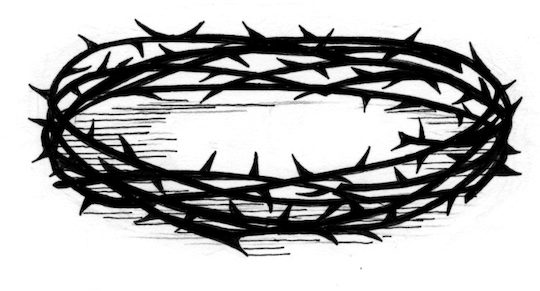
As followers of Jesus, we are one with Him. This means that His character permeates every inch of our being. We share His desires and DNA. Jesus, being the perfect husband that He is, overflows with a desire to serve and a willingness to sacrifice. Because we are continuously becoming more like Jesus, this desire to serve and sacrifice abounds in us as well.
Sacrifice is one of the most beautiful, selfless, powerful aspects of love imaginable. Think of how the good husband sacrifices whatever necessary for the comfort and pleasure of his wife. Think of how the good mother sacrifices her time and peace of mind for her child's nourishment. Even the physiognomy of the human body speaks of the beauty and power of sacrifice. If a breastfeeding mother is unable to absorb sufficient nutrients, her body will take from its own reserve, infusing her milk with her own required nutrients, so that her child's body does not go without. If a man feels unable to serve and support his own family, his brain chemistry will undoubtedly go for a downward spiral. Why? Why are our bodies and lives hardwired with such a predisposition for sacrifice and service? Because sacrifice is a fundamental design and sublimity of life, love, and therefore God.
However, just like everything else in creation, sacrifice has its counterfeit: self-abasement; self-denial; rejection of the flesh for no other reason than to gain a feeling of supremacy and mastery over oneself. To press a crown of thorns into your head, simply because it hurts, and not because you wish to give your blood for another; to cloth yourself in rags, simply because it's uncomfortable, and not because you wish to clothe another; to deny yourself food, simply because it's difficult, and not because you wish to feed another, is to wrap selfishness in white.
Self-abasement can be just as selfish an action as stereotypical egotism, because, by its very nature, self-denial keeps your focus on your self, rather than where it should be: God and others. Self-denial is introspection taken to such an extreme that extrospection becomes illusive as our eyes neglect to turn outward for so long that eventually, we forget there are other souls in the world.
Monastic, painstaking self-denial is all too often worn as a badge of honor adorning the breast of those who, with unquestionably pure motives, have come to consider personal sacrifice their indicator of personal worth and their self-inflicted pain as their savior.
But sacrifice, in its supreme and intended form, should have nothing to do with yourself and everything to do with the service and pleasure of another. If your goal in sacrifice is to debase yourself rather than elevate another, your focus has morphed from sacrifice into a self-improvement exercise.
Some say, “Self-abasement is the ultimate act of selflessness, because nothing is to be gained for the self, and therefore no ulterior, self-centered motive can exist.” But consider the idea that self-abasement and self-denial come with a feeling of ecstasy, security, and contented pride with oneself that is completely capable of being selfishly sought, and often is.
After all, does it not feel pleasurable to serve another? To be the source of another's joy and delight? To be the giver of happiness to a fellow soul? Does it not feel inwardly affirming to stave desire and comfort to a cross of denial? To feel like the master of oneself? To sit the will on a throne and prove its supremacy by continually exerting its power over every wish? Self-abasement and denial can be the straw we use to suck a drug of self-affirmation into our nose.
Monastic deprivation of the body and heart, self-degradation, and the denial of desire can all be sought out of selfishness. And so we have cloisters and convents of Christians who, out of pure and precious motives, trudge about, lashing their backs in what they think is humility, but in reality is often unconscious addiction to the feelings of holiness we derive from self-degradation.
Am I saying that monks, nuns, and followers of Jesus approach self-abasement from a selfish perspective? Not at all. On the contrary, I believe most approach self-flogging from a desire to sacrifice all, just as Jesus sacrificed all. The motive with which we approach self-abasement is touching and precious in spite of error. To quote Victor Hugo:
"Self-sacrifice, even when misdirected, is still self-sacrifice."
I am not trying to condemn the motive with which we approach self-abasement as selfish. I'm simply condemning self-abasement itself and trying to point out a tendency that I have observed in both myself and humanity at large: we enjoy the path a whip cuts across our back. Because of this, self-abasement is often sought, when the goal all along should have instead been sacrifice.
This is the great distinction I'm trying to make. There is a difference between self-abasement and genuine sacrifice. One is the core element of Buddhism, the other of Christianity. One is the extinguishment of desire, the other is the elevation of another's desires. One is the coalition of hideousness, the other the epitome of sublimity. One strives for a euphoric sense of holiness and accomplishment, the other contains the interests of another foremost at heart.

Sources:
Les Miserables (Victor Hugo)
The Greatest Artist of All Time (Jefferson Bethke)
https://www.youtube.com/watch?v=AZHRpi4z7zk
The Greatest Artist of All Time (Jefferson Bethke)
https://www.youtube.com/watch?v=AZHRpi4z7zk

Comments
Post a Comment